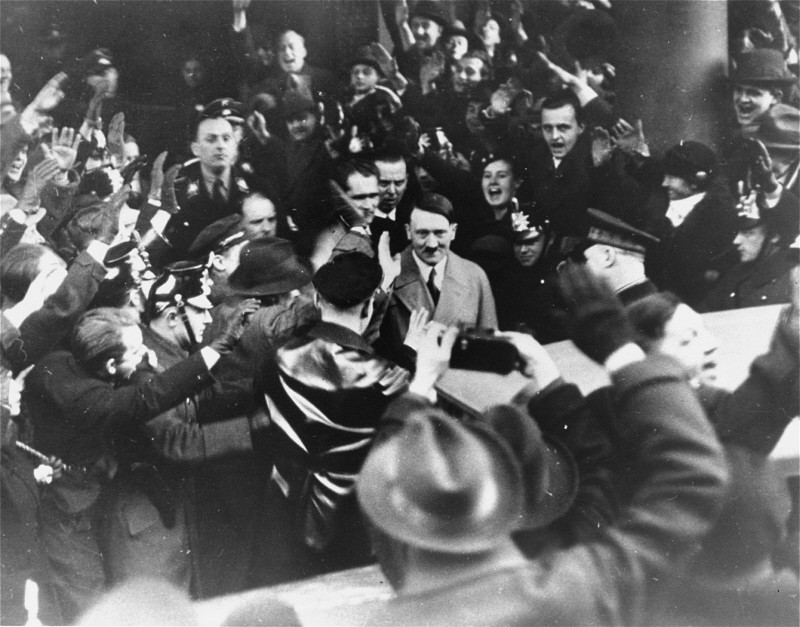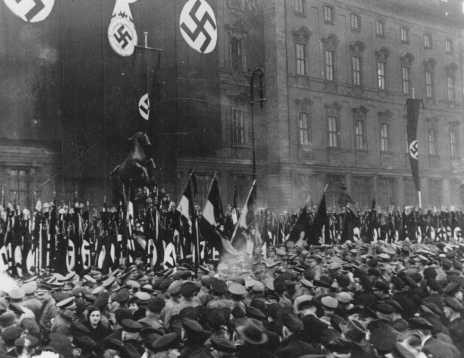
Foundations of the Nazi State
Following his appointment as chancellor by President Paul von Hindenburg on January 30, 1933, Adolf Hitler began laying the foundations of a Nazi state based on racist and authoritarian principles. In less than six months, Germany was transformed from a democratic state into a one-party Nazi dictatorship.
Key Facts
-
1
Nazi propagandists promoted the myth that the state was creating a national community (Volksgemeinschaft) open to all “Aryan” Germans, regardless of class, region, or religion. Jews, Black people, and Roma (Gypsies) were excluded as racial outsiders.
-
2
The Nazi state pursued a policy of "coordination" (Gleichschaltung), by which political parties, state governments, and cultural and professional organizations were aligned with Nazi goals.
-
3
Authority in government, the party, economy, family, and so on, flowed downward from Hitler and was to be obeyed unquestioningly.
Following his appointment as chancellor by President Paul von Hindenburg on January 30, 1933, Adolf Hitler began laying the foundations of the Nazi state. Guided by racist and authoritarian principles, the Nazis eliminated individual freedoms and pronounced the creation of a Volk Community (Volksgemeinschaft)—a society which would, in theory, transcend class and religious differences.
The Reichstag Fire Decree on February 28, 1933, permitted the suspension of basic civil rights—rights that had been guaranteed by the democratic Weimar Constitution. The Third Reich became a police state in which Germans enjoyed no guaranteed basic rights and the SS, the elite guard of the Nazi state, wielded increasing authority through its control over the police. Political opponents, especially those in the Communist Party of Germany and the Social Democratic Party of Germany, along with Jews, were subject to intimidation, persecution, and discriminatory legislation.
In the first two years of his chancellorship, Hitler followed a concerted policy of "coordination" (Gleichschaltung), by which political parties, state governments, and cultural and professional organizations were brought in line with Nazi goals. Culture, the economy, education, and law all came under Nazi control.
Using the Civil Service Law of April 1933, German authorities began eliminating Jews from governmental agencies, and state positions in the economy, law, and cultural life. The Nazi government abolished trade unions. Workers, employees, and employers were forced into the German Labor Front, which was under the control of Nazi leader Robert Ley. The Nazis also attempted to synchronize the Christian denominations and their affiliated youth groups, but were not entirely successful.
With the passage of the Enabling Law (March 23, 1933), the German parliament (Reichstag) transferred legislative power to Hitler's cabinet and thus lost its reason for being. By mid-July, the Nazi Party was the only political party left in Germany. The other parties had been either outlawed by the government or had dissolved themselves under pressure. The Reichstag became a rubber stamp for Hitler's dictatorship.
The Führer's will became the foundation for all legislation. Indeed, with the establishment of Hitler's dictatorship, the Führer principle (Führerprinzip) came to guide all facets of German life. According to this principle, authority—in government, the party, economy, family, and so on—flowed downward and was to be obeyed unquestioningly.

Upon Hindenburg's death in August 1934, Hitler had himself designated as both Führer and Reich Chancellor. Armed forces personnel swore an oath of loyalty to him in this function. While as Reich Chancellor Hitler's personal power remained limited by the laws of the German state, as Führer his personal power was unlimited and his will was equated with the destiny of the German nation.
Critical Thinking Questions
- Although the Nazi Party never won more than 38% in a free election, it was invited into power and its leaders destroyed the institutions of a democratic government in two months. What choices by citizens and officials made this happen?
- How can the use of emergency legislation or powers (in the face of a perceived crisis) be a warning sign for mass atrocity later on?
- How can knowledge of the events in Germany and Europe before the Nazis came to power help citizens today respond to threats of genocide and mass atrocity in the world?

